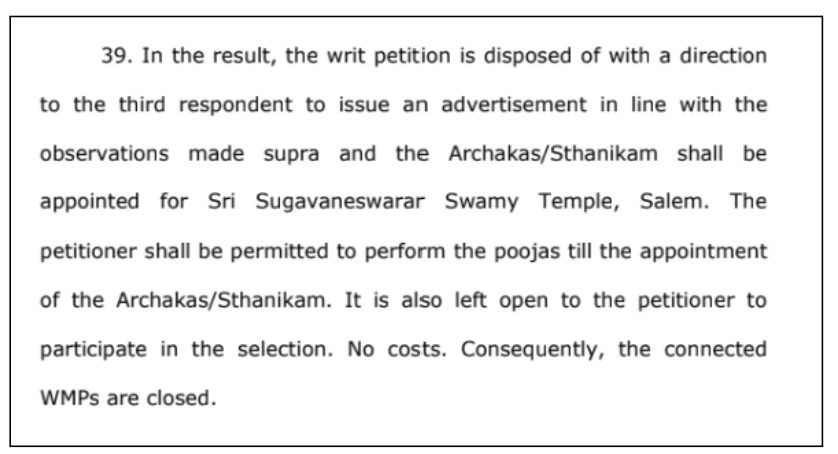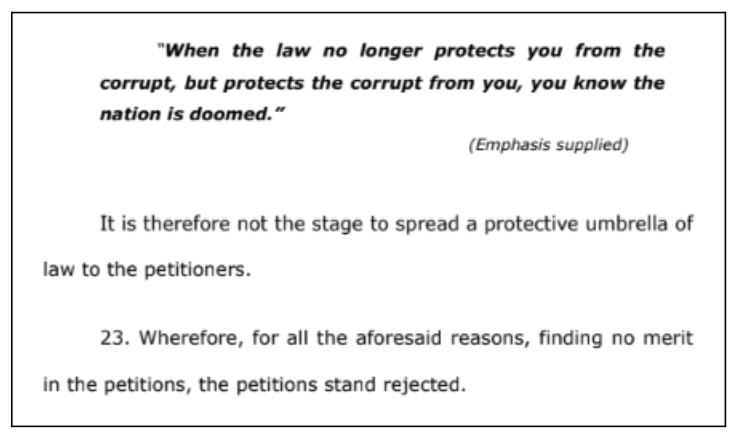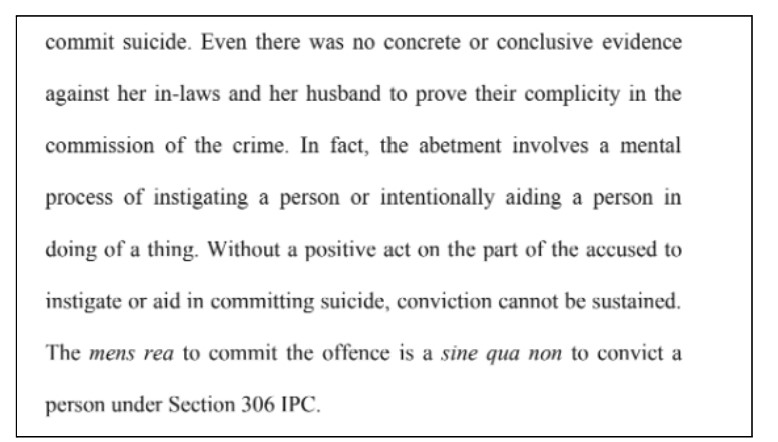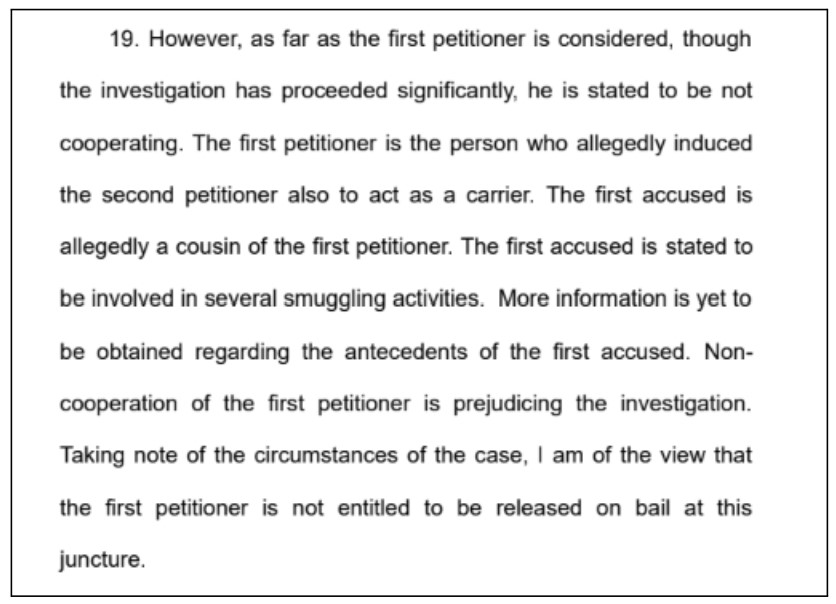In this edition of the court judgements review, we look into the Madras HC’s judgment that said any person belonging to any caste or creed can be appointed as an Archaka provided he is well-versed and properly trained to perform the rituals, Karnataka HC’s assertion that both giver and taker of corruption are susceptible to prosecution, Punjab HC’s comments that merely because a woman committed suicide in matrimonial home, doesn’t imply that the husband and in-laws harassed her, among others.
Madras HC: Any person belonging to any caste or creed can be appointed as an Archaka provided he is well-versed and properly trained to perform the rituals
The complainant in the case Muthu Subramania Gurukkal vs. the Commissioner, Hindu Religious & Charitable Endowment Department, and others had filed a petition before the Court in 2018 against the advertisement for the appointment to the position of Archakas/Sthanikam (or someone who performs rituals). He contended that the advertisement infringed upon his hereditary right to the position as it was his family belonging to a certain caste who occupied the position since time immemorial. He also contended that the Executive Officer could not appoint the priest referring to an order of the Madras High Court which held that a committee was to be appointed for identifying temples belonging to Agama and until then, the appointment cannot be made. As per the order, in Agamic temples, appointment to the position was to be done as per custom. Further, he also questioned the certificate courses recognised by the Department and submitted that the Agamas and Vedas cannot be learnt by undergoing a certificate course.
Justice Anand Venkatesh of the Madras High Court observed that in temples governed by the Agama, the Trustees/Fit Person only must ensure that the Archaka/Sthanikam to be appointed is well-versed and properly trained to perform the pooja as per the Agama. He highlighted that the pedigree based on caste would have no role to play in the appointment if the person so selected otherwise satisfies the requirements. It was also noted that the division bench had not observed in the order that the Trustees or the Fit persons cannot make appointments till the committee finalizes the report. It also allowed the recruitment process to continue and stated that the petitioner can also apply for the same.

Consumer Commission directs Bank to pay compensation for deficiency in service
In Abha Dobriyal & Another vs. Bank of Baroda & HUDCO, the complainants were a couple who had taken a housing loan of Rs. 50 lakhs from the Bank of Baroda in October 2018. They did so to avail benefits of subsidy under the Pradhan Mantri Awas Yojana (PMAY) scheme and submitted the necessary documents to the bank. Later, in August 2020, they received a message that an Application ID had been generated for PMAY (U). However, they did not get a response of any benefit from the bank despite sending multiple emails and reminders to the bank. The couple filed a case before the District Consumer Disputes Redressal Commission, Chandigarh alleging deficiency in service and unfair trade practice on the part of the bank because of which they had to face financial loss, harassment, and mental agony.
In its reply, the bank acknowledged the disbursal of the loan. But it submitted that the complainants had not approached the bank for the scheme. It added that the couple may have applied for the scheme online because of which the application number was generated. The bank also stated that they had no clue about the application made by the complainants under the scheme and so, there was no point in considering the mails.
Housing and Urban Development Corporation Limited (HUDCO) stated that the bank had uploaded the complainant’s subsidy claim in July 2020. But the claim was rejected by the corporation’s portal due to the wrong instalment number and a mismatch of the cumulative loan disbursement with the loan disbursement submitted up to the previous instalment. Further, it was stated that the bank did not upload the revised forms.
The Consumer Commission presided over by members, Surjeet Sharma and B M Sharma observed that HUDCO’s statement completely contradicted the bank’s contention that it was completely unaware of the application. It concluded that the bank’s service was deficient and directed the Bank of Baroda to pay Rs 1 lakh for the same along with the litigation cost. The Commission dismissed the complaint against HUDCO regarding the credit benefit or subsidy claim.

Karnataka HC: Both giver and taker of corruption are susceptible to prosecution
In Kailash S Raj & others vs. State of Karnataka, the Karnataka High Court dealt with two petitions filed by the three owners of Karnataka Aromas Company, and its two employees, Albert Nicolas and Gangadhar, who were charged under sections 7(b), 7A, 8, 9 & 10 of the Prevention of Corruption Act, 1988. Following a complaint lodged against Maadal Virupakshappa and his son for demanding illegal gratification for processing a tender in Karnataka Soaps & Detergents Limited, the Lokayukta police conducted a raid in the accused’s office where they found the two employees of Karnataka Aromas Company carrying cash.
The petitioners who were booked for offering bribes argued that at best they could be charged under Sections 8, 9 and 10 of the Act as they were not public servants. They contended that the new provision of the Prevention of Corruption Act states that if the bribe-giver is compelled to give a bribe in a circumstance beyond his control, he should report it to the investigation agency within one week. They claimed that the FIR was registered against them within that week and so the petitioners could not be charged with the crime.
The Single Judge Bench of Justice M Nagaprasanna dismissed the petitions. If the petitioners were not booked, it would make the very object behind the amendment to the Act redundant. The amendment makes both the giver and taker equally responsible for corruption. Based on the proofs submitted and the narrations of the petitioners, he stated that “it is high time the menace of corruption is plugged and nipped in the bud by making the bribe giver susceptible to such prosecution, like the bribe taker.”

Punjab HC: Merely because a woman committed suicide in matrimonial home, doesn’t imply that the husband and in-laws harassed her
According to the facts of the case, in the State of Haryana vs. Darshan Lal and another, the respondent’s wife had committed suicide. Her father alleged that the respondent and his family tortured her for dowry. Despite giving them dowry beyond his capacity, he alleged that respondents and family would ask his daughter for more, maltreated her, and even threatened to kill her if the amount demanded was not paid. The father of the deceased alleges that his daughter committed suicide because of this torture.
The Trial Court observed the facts of the case and acquitted the husband of the charges. It was argued before the Punjab and Haryana High Court that the respondents (in this case) were wrongly acquitted. The Single Judge Bench of Justice Shekhawat observed that the father of the deceased had admitted that during the 18 years of subsistence of her marriage, no complaint or application alleging maltreatment or misbehaviour by her husband was made by the deceased. Further, the Court observed that the father could not give the exact details of the date or day for any of the accusations. He pointed out that the allegations were vague and general. Simply because a woman committed suicide in the matrimonial home does not mean that the husband and in-laws harassed her or abetted the suicide. The acquittal was upheld by the Court.

Kerala HC: Cumulative value of illegal imports carried by all individuals with a common intention must be considered to calculate value of goods
In Pulikkippoyil Sharafudheen and Another vs. Superintendent of Customs, the Kerala High Court was considering bail applications filed by a couple who were caught smuggling gold worth Rs. 1.2 crores in the domestic market. The petitioners were the second and third accused while the first accused was one Amjad Mihran who used carriers, including family members, to smuggle gold into the country. Citing that the family had four children and that the offence was generally bailable, the couple filed the bail application.
The Single Judge Bench of Justice Bechu Kurian Thomas observed that as per statutory provisions, if the goods, which have been mis declared or its duty evaded or imported illegally, have a market price of more than Rs. 1 crore, the offence becomes non-bailable. He held that, if the quantity of gold illegally imported was split into different parts and carried by different persons with a common intention, then the collective value of the illegal imports by all the individuals should be considered for calculating the value of the goods. He ascertained that such an approach was necessary, especially when a common thread, such as that of a family, runs through the body of these persons, apart from the common intention that binds them together.
The first petitioner was thus denied bail by the Court as he was involved in several smuggling activities. The bail plea by the second petitioner was accepted subject to the condition of her executing a bond for Rs.1 lakh with two solvent sureties.



